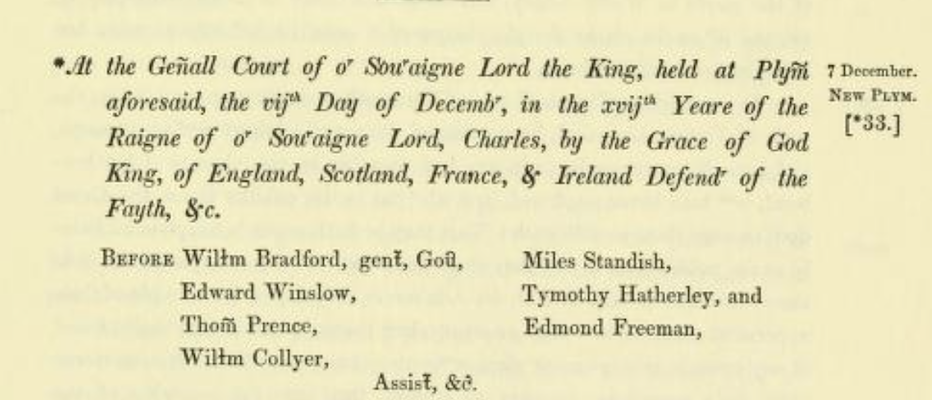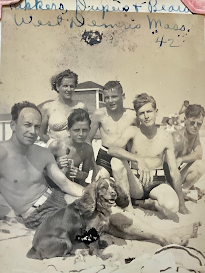More Fact Than Fiction - Was an Event at Yarmouth the Inspiration for the Scarlet Letter?
Sometimes while researching I find random bits of information that, while not part of my own family history, are too interesting not to share. I recently came across a record that on first view seems to relate to a familiar Yarmouth family - the Brays. However, the little digging I've done promises something more complicated. There may be a family connection to the Yarmouth Brays that future research could uncover, however the Thomas Bray discussed here - and subject of the following described criminal acts and court documents - is probably of a branch of Brays from north of Boston, who were original settlers of the Gloucester area. There is no doubt though that the illegal act took place at Yarmouth, and some literary discussion points to the event as a possible inspiration for Nathaniel Hawthorne's Scarlet Letter (there are a couple of possibilities). The court ordered punishment, carried out at Yarmouth, adds a whole new reality of what early life was like in Yarmouth. It was of course part of Plymouth Colony, inhabited by the same families and people of the time, under the same laws and societal norms. This record brings into focus the reality of Yarmouth's earliest days. Just like some people seem shocked to believe that there was slavery, servitude, and unkindness in early Yarmouth, I was awakened to the fact of Yarmouth not as a stand alone village, but a regular part of the century of it's birth.
According to the Plymouth Court records of 1641, it appears a Francis Linceford made a complaint against Thomas Bray of Yarmouth for the return of goods which he had left in Bray's possession whilst Linceford was on a sailing venture to the West Indies. The Court ordered that Mr. Anthony Thacher, Mr. Nicholas Sympkins, and Richard Hore, or any two of them, shall see to the return of goods to Linceford excepting for "one white rugg, one bed and bolster, sword, musket & bandilires, foure iron wedges, one hoggshead, one tubb, one kettle, & two iron ringes," which were made over to Bray that he should pay to certain persons to whom Linceford was indebted when he went from Yarmouth to the West Indies.
Another entry in Court the same day 7 December 1641 :
Transcription: Forasmuch as Thomas Bray, of Yarmouth, a single pson, and Anne, the wyfe of Francis Linceford, have comitted the act of adultery and uncleanesse, and have divers tymes layne in one bed together in the absence of her husband, wch had beene confessed by both parties in the publike Court, the Court doth censure them as followeth: That they be both severely whipt immediately at the publik post, & that they shall weare (whilst they remayne in the gofment) two letters, viz AD, for Adulterers, daly, upon the outeside of their uppermost garment, in a most emenent place thereof; and if they shalbe found at any tyme in any towne or place within the gouerment wthout them so worne upon their uppermost garment as aforesid, that then the constable of the towne or place shall take them, or either of them, omitting so to wear the said two letters, and shall forthwth whip them for their negligence, and shall cause them to be imediately put on againe, and so worne by them and either of them; and also that they shalbe both whipt at Yarmouth, publikely, where the offence was comitted, in such ftt season as shalbe thought meete by Mr Edmond Freeman & such others as are authorized for the keepeing of the Courts in these ptes.According to several online blogs, a newspaper article in the Sunday, July 17 1927 edition of The Springfield Daily Republican, as well as several literary discussions, this incident in Yarmouth is touted as one of just a few instances in the Plymouth Records that could have served as Nathaniel Hawthorne's inspiration. Apparently Nathaniel Hawthorne was not one to release his sources, but it has been offered that he may have had access to historic court records. Genealogy bloggers who descend from the Bray's at Gloucester inform that this Thomas Bray (perhaps the first Bray to come to America) left for Gloucester shortly after the "crime" at Yarmouth, departing for Massachusetts Bay Colony (as opposed to Plymouth Colony) where he might not be required to wear his "Adulterer" patch. I have looked at Bray Family of Yarmouth records and while there were certainly Thomas Brays in Yarmouth early, it seems none were that early, and I find none would have been unmarried or of an appropriate age for the event. Was this Thomas Bray and his "friends" the Lincefords in town due to some marine/shipping activities? A basic research does identify a Thomas Bray as a ship carpenter, living at Gloucester; he married a Mary Wilson there, and died in 1691.
Some basic research finds no record of Francis Linsford at Yarmouth, but does uncover a marriage record for Francis Linsford and "Ann" on 30 December 1647 at Marblehead some six years after the incident. Was this the same Ann or were the Linsford's divorced? Francis Linsford appears in several records at Marblehead through the 1600's.

(Note that on the same day Mr. Gray of Yarmouth was committed to prison for swearing, and Nicholas Sympkins of Yarmouth was presented for lending a pistol to an Indian.)


*****************************************
Sources:
Shurtleff, M.D., Nathaniel B., editor, Records of the colony of New Plymouth in New England: printed by order of the legislature of the Commonwealth of Massachusetts, Court Orders: Vol. II 1641-1751, Boston, from the Press of William White, Printer to the Commonwealth, 1855, AMS Press, Inc., 1968, New York, Internetarchive.org.
Cape Cod Library of Local History and Genealogy, Vol. II, The Bray Family of Yarmouth, image 324, Ancestry.com.Original data: Babson, John J.. History of the town of Gloucester, Cape Ann : including the town of Rockport. Gloucester Mass.: Procter Bros., 1860, Chapter IV, Early Settlers.
"Massachusetts, Town Clerk, Vital and Town Records, 1626-2001", , FamilySearch (https://www.familysearch.org/ark:/61903/1:1:FH1Y-46N : Fri Mar 08 20:01:55 UTC 2024), Entry for Thomas Bray, 30 November 1691.
U.S. New England Marriages Prior to 1700, Ancestry.com.
Massachusetts, U.S., Town and Vital Records, Marblehead, Ancestry.com.
Some Related Blog Posts:
https://www.mass.gov/news/scarlet-letter
http://www.histarch.illinois.edu/plymouth/Lauria1.html#V
https://www.genealogy.com/forum/surnames/topics/bray/3098/
https://www.genealogy.com/forum/surnames/topics/bray/5079/
https://nutfieldgenealogy.blogspot.com/2015/08/surname-saturday-bray-of-gloucester.html













Comments
Post a Comment
Please feel free to comment and make suggestions, however all comments are subject to blog author approval before being posted.